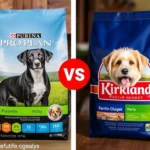
Introduction
Bichon Frises are charming, playful, and affectionate little dogs known for their hypoallergenic coat and cheerful disposition. These small breeds typically weigh between 10 to 20 pounds and stand about 9 to 11 inches tall. Despite their small size, Bichon Frises have specific dietary needs that must be met to ensure they remain healthy and happy.
Proper nutrition is essential for Bichon Frises. It not only supports their overall health but also helps prevent common health issues associated with the breed, such as allergies and obesity. Choosing the best dog foods for Bichon Frises involves understanding their unique nutritional requirements and selecting high-quality ingredients that cater to their specific needs.
Understanding Bichon Frise Nutrition Needs
Nutritional Requirements
When selecting the best dog foods for Bichon Frises, it’s important to understand their nutritional requirements, which can be categorized into macronutrients and micronutrients.
- Proteins: Essential for growth, muscle development, and overall health, proteins should come from high-quality sources. Look for dog foods that list real meat (like chicken or beef) as the first ingredient.
- Fats: Healthy fats provide energy and support skin and coat health. Omega-3 and Omega-6 fatty acids are particularly beneficial for Bichon Frises.
- Carbohydrates: While dogs do not require carbohydrates as a primary energy source, high-quality grains or vegetables can provide fiber and essential nutrients.
Additionally, micronutrients—vitamins and minerals—play a crucial role in your Bichon’s health, supporting their immune system and overall well-being.
Common Health Issues
Bichon Frises are prone to certain health issues that can affect their dietary needs:
- Allergies and Sensitivities: Many Bichon Frises suffer from food allergies, which can manifest as skin irritations or digestive issues. Identifying and avoiding allergens is essential for their health.
- Weight Management Concerns: Due to their small size and tendency to become overweight, it’s crucial to monitor their weight and choose a dog food that supports a healthy weight.
- Digestive Health Considerations: Bichon Frises can have sensitive stomachs. Foods with easily digestible ingredients are often recommended to prevent gastrointestinal distress.
Ingredients to Look For in Dog Food
High-Quality Proteins
When searching for the best dog foods for Bichon Frises, high-quality proteins should be at the forefront. Look for:
- Real Meat: Ingredients like chicken, beef, or fish should be the primary protein sources. Avoid foods that rely on meat by-products or fillers.
- Animal Meals: Chicken meal or fish meal can also be beneficial, as they contain concentrated protein levels.
Healthy Fats
Fats are an important energy source and are vital for skin and coat health. Opt for dog foods that include:
- Animal Fats: Chicken fat and fish oil are excellent sources of Omega-3 and Omega-6 fatty acids.
- Plant Oils: Flaxseed oil and canola oil can also provide essential fatty acids.
Whole Grains vs. Grain-Free
The debate between whole grains and grain-free diets continues, but both have merits.
- Whole Grains: Ingredients like brown rice and oatmeal can be beneficial for digestion and provide energy. They also offer fiber, which supports gastrointestinal health.
- Grain-Free Options: For Bichon Frises with sensitivities, grain-free options with alternative carbohydrate sources like sweet potatoes or peas can be a good choice. However, it’s important to ensure the food still contains adequate fiber.
Essential Vitamins and Minerals
Bichon Frises require various vitamins and minerals for optimal health. Look for foods that include:
- Vitamins: A, D, E, and B vitamins support various bodily functions, including immune response and energy metabolism.
- Minerals: Calcium, phosphorus, and potassium are essential for bone health and muscle function.
- Supplements: Some high-quality dog foods may include probiotics and prebiotics for digestive health.
Types of Dog Food Suitable for Bichon Frises
Dry Dog Food (Kibble)
Kibble is a popular choice for many dog owners due to its convenience and shelf stability.
- Advantages: Kibble helps maintain dental health by reducing tartar buildup and is easy to store and serve.
- Disadvantages: Some formulas may include fillers or low-quality ingredients. Always read labels carefully.
Recommended Brands for Bichon Frises:
– Blue Buffalo Life Protection: Offers high-quality protein and whole grains.
– Royal Canin Small Breed: Specifically formulated for small breeds like Bichon Frises.
Wet Dog Food
Wet dog food can be a great complement to a dog’s diet.
- Benefits: It provides hydration and is often more palatable for picky eaters.
- Top Wet Food Options:
- Wellness CORE Grain-Free: High in protein and grain-free.
- Purina Pro Plan Savor: Offers a balance of nutrients and great taste.
Raw Diets
Raw feeding has gained popularity among dog owners, but it comes with specific considerations.
- Overview: Raw diets typically consist of raw meat, bones, fruits, and vegetables. Proponents argue it mimics a dog’s natural diet.
- Considerations and Risks: Raw diets can lead to nutritional imbalances and pose a risk of bacterial contamination. It’s crucial to consult with a veterinarian before making this choice.
Homemade Dog Food
Preparing homemade meals for your Bichon Frise can be rewarding but requires knowledge.
- Basic Guidelines: Ensure a balanced diet with proteins, carbohydrates, and fats. Avoid toxic foods such as chocolate, grapes, and onions.
- Essential Ingredients: Lean meats, vegetables like carrots and peas, and whole grains can create nutritious meals.
Factors to Consider When Choosing Dog Food
Age and Life Stage
Bichon Frises have different dietary needs at various life stages:
- Puppies: Require higher protein and calorie content for growth.
- Adults: Should maintain a balanced diet to avoid obesity.
- Seniors: May benefit from specific formulations that support joint health and digestion.
Activity Level
A dog’s activity level significantly impacts its dietary requirements.
- Active Bichon Frises: May require more calories and protein.
- Less Active: Should have a controlled diet to prevent weight gain.
Allergies and Dietary Restrictions
Identifying food allergies is crucial for your Bichon Frise’s health.
- Symptoms: Look for signs like itching, digestive upset, or ear infections.
- Accommodating Restrictions: Choose hypoallergenic dog foods or those formulated for specific sensitivities if allergies are present.
Budget Considerations
Quality dog food can vary in price, but it’s essential to balance quality and cost.
- Investing in Quality: A higher-quality dog food may lead to better health, potentially reducing vet bills over time.
- Budget-Friendly Options: Some brands offer quality ingredients at a lower price point without compromising nutritional value.
Top Recommended Dog Foods for Bichon Frises
Premium Commercial Brands
For those looking to invest in high-quality nutrition, consider these top brands:
- Orijen: Known for its high protein content and fresh ingredients.
- Taste of the Wild: Offers grain-free options rich in nutrients and flavor.
Best Grain-Free Options
If you’re considering grain-free options, look into:
- Merrick Grain-Free: Provides a balanced diet with quality protein sources.
- Canidae Pure: Limited ingredient formulas suitable for sensitive stomachs.
Best Budget-Friendly Choices
For budget-conscious dog owners, these brands offer quality at an accessible price:
- Nutro Ultra: Offers a variety of flavors with wholesome ingredients.
- Iams ProActive Health: Provides balanced nutrition without breaking the bank.
Transitioning to a New Dog Food
Importance of Gradual Transition
Sudden changes in diet can lead to digestive issues. A gradual transition is key to avoiding stomach upset.
Step-by-Step Guide for Transitioning
- Week 1: Mix 25% new food with 75% old food.
- Week 2: Increase to 50% new food and 50% old food.
- Week 3: Move to 75% new food and 25% old food.
- Week 4: Fully transition to the new food.
Monitoring Your Dog’s Response
During the transition, keep an eye on your Bichon Frise’s behavior and digestion.
- Signs of Successful Transition: Healthy appetite, normal stool, increased energy.
- Digestive Issues: Diarrhea, vomiting, or excessive gas may indicate the need for a slower transition or a different food choice.
Conclusion
Proper nutrition is paramount for maintaining the health and happiness of Bichon Frises. By understanding their unique dietary needs and choosing high-quality ingredients, you can ensure your furry friend thrives. Always consult with your veterinarian for personalized dietary advice and to address any specific health concerns.
Whether you opt for premium commercial brands, explore grain-free options, or consider homemade meals, the key is to find the best dog foods for Bichon Frises that suit your pet’s individual needs.









